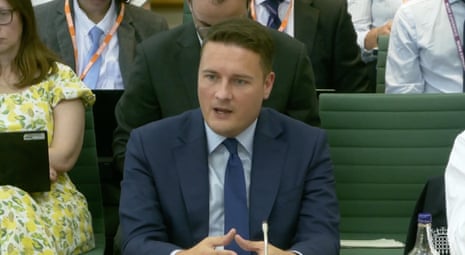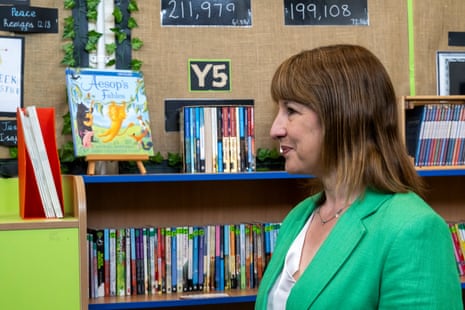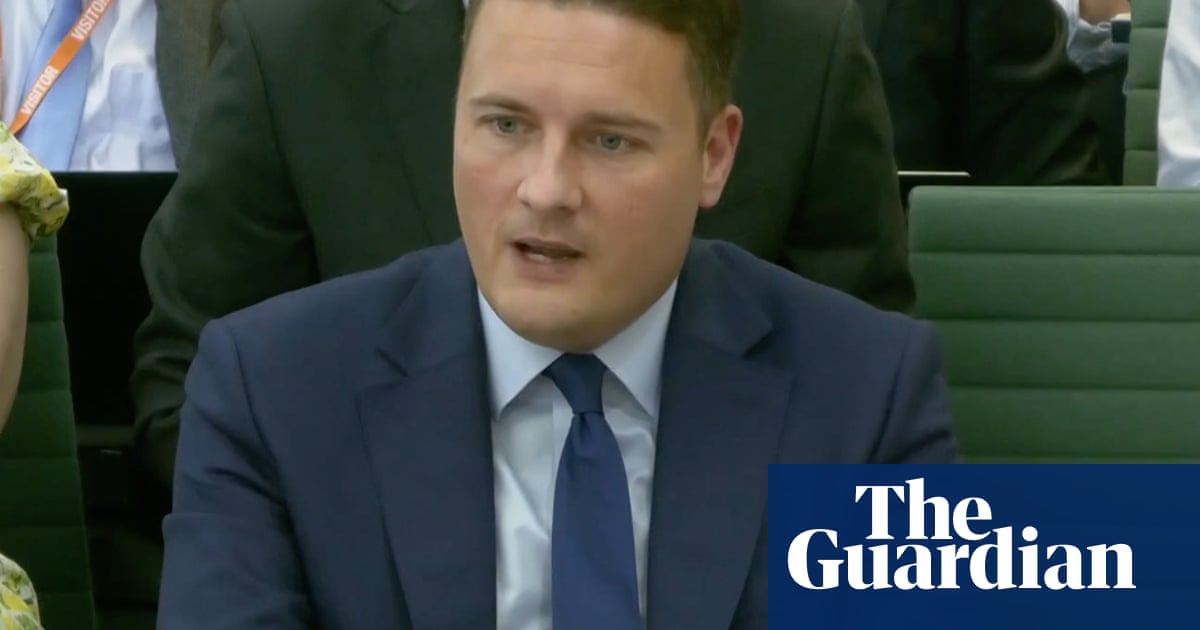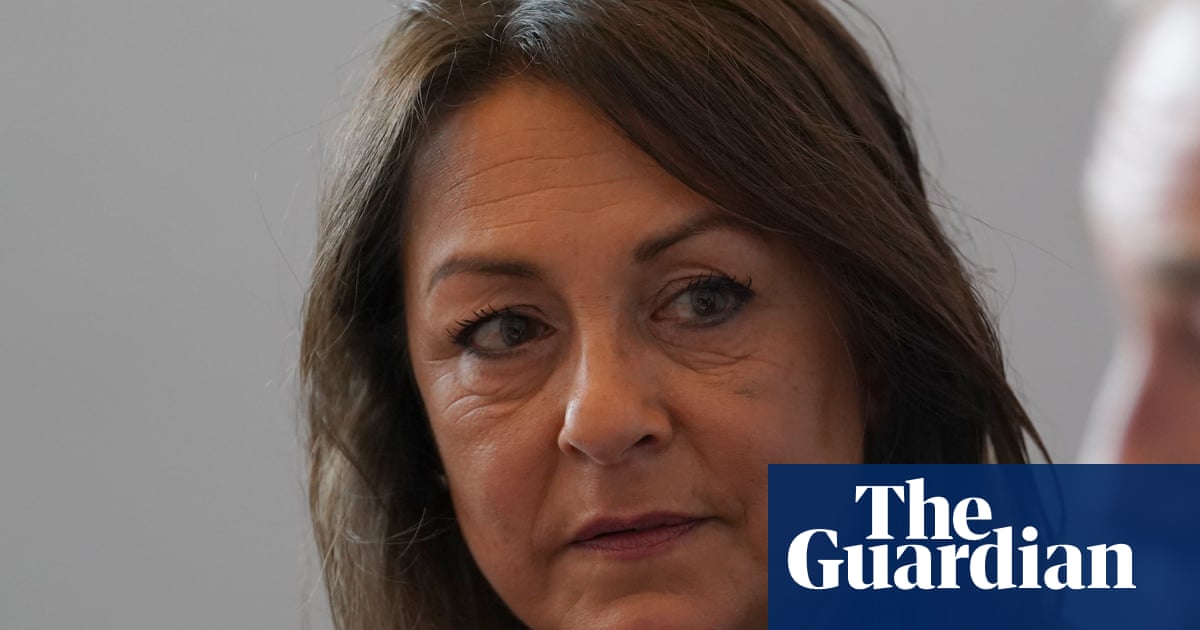Streeting says BMA's tactics 'shockingly irresponsible' because resident doctors being urged not to tell trusts if they're striking
At the health committee, in response to a question from Alex McIntyre (Lab), Wes Streeting, the health secretary, says he is pleased that the BMA has agreed to a meeting this week to discuss how the resident doctors’ strike could be averted.
He says:
I have to be clear with the committee, as I was with the House last week, that there is no more room for manoeuvre on pay, but there are lots of other things that we can do and should do that would lead to material improvements.
He says, if the BMA goes ahead with the strike, that will be a “catastrophic mistake”.
He says he hopes he and the BMA can find a way of avoiding “the misery that will be inflicted” by the strike.
Q: What impact would it have on waiting lists?
Streeting says the government can mitigate against the impact of strikes. But it cannot stop them have consequences, he says.
He says appointments would be delayed. He says he has a relative waiting for an appointment, and he says they are “dreading what I fear is an inevitable phone call”.
He goes on:
The other thing that I have found actually shockingly irresponsible about the BMA’s position is their leaders seem to be telling their members not to inform their trusts or their employers if they’re going out on strike.
Now, I might not agree with the BMA strike action, but I do accept they have a right to strike. I do accept they’ve followed the rules in order to go on strike.
What I cannot fathom is how any doctor in good conscience would make it harder for managers to make sure we have safe staffing levels, would make it harder for other staff who are going to be turning up to work that day, not least the staff who have not had a higher percentage pay rise, many of whom are paid less than resident doctors.
So I just think the sort of the BMA’s approach to this from start to finish has been completely wrong.

Key events Show key events only Please turn on JavaScript to use this feature
No 10 hints heat pumps that provide air conditioning could qualify for boiler upgrade subsidies
Ed Miliband, energy secretary, will be making a statement to MPs soon after 3.30pm on the state of the climate report. (See 10.21am.)
In a recent Bagehot column, the Economist complained that Britian has been a bit useless at adjusting to the fact that the planet is getting warmer. As an example, it cited rules on heat pump subsidies. Bagehot said:
If there is a conspiracy against air-conditioning in Britain, it goes right to the top. The government offers subsidies worth £7,500 to people replacing a gas boiler with an electric heat pump, but only if it produces solely heat. A system that can heat in winter and cool in summer receives nothing. Mercifully, Labour is considering extending the subsidies, yet that is not guaranteed to happen. A puritanical streak in British policymaking runs deep. Only the most banal conspiracies turn out to be true: the Deep State exists and it tries to keep you warm on summer nights.
But there was good news for the Economist at the No 10 lobby briefing this morning. Asked about this issue, the No 10 spokesperson hinted the rules will change. He said:
Keeping homes cool in hot weather is just as important as heating them in the winter. That’s why we’ve consulted on including air to air heat pumps, which also cool air, under the boiler upgrade scheme. Our response to that will be published in due course.
Ben Coleman (Lab) asks if there should have been more in the 10-year plan about race inequalities in health.
Streeting accepts this is a big problem.
If you look at the experiences of Black and Asian staff, if you look at the experiences of Black and Asian patients, even adjusting for class inequalities and social determinants, we are seeing unequal outcomes for patients.
We’re seeing bullying of staff which, when you think about how long we’ve had black staff in the NHS – since the beginning of the NHS, I think – it’s just completely intolerable.
We don’t have enough Black and Asian faces around executive and non-executive boards across the NHS, and that culture flows right down.
Streeting says he was “really shocked” by what he has heard in his work on problems with maternity services. He says one woman told him about being told “I thought you were a strong black woman” as an excuse for not getting enough pain relief. He also heard of Asian women being described as divas, he says.
Gregory Stafford (Con) asks Streeting why he seemed to think it was acceptable for resident doctors to go on strike when the Conservatives were in power, but not now that Labour is in power.
Streeting says he thought the previous strikes were avoidable. At the time the government was refusing to sit down and negotiate with the BMA, he says.
Streeting says BMA's tactics 'shockingly irresponsible' because resident doctors being urged not to tell trusts if they're striking
At the health committee, in response to a question from Alex McIntyre (Lab), Wes Streeting, the health secretary, says he is pleased that the BMA has agreed to a meeting this week to discuss how the resident doctors’ strike could be averted.
He says:
I have to be clear with the committee, as I was with the House last week, that there is no more room for manoeuvre on pay, but there are lots of other things that we can do and should do that would lead to material improvements.
He says, if the BMA goes ahead with the strike, that will be a “catastrophic mistake”.
He says he hopes he and the BMA can find a way of avoiding “the misery that will be inflicted” by the strike.
Q: What impact would it have on waiting lists?
Streeting says the government can mitigate against the impact of strikes. But it cannot stop them have consequences, he says.
He says appointments would be delayed. He says he has a relative waiting for an appointment, and he says they are “dreading what I fear is an inevitable phone call”.
He goes on:
The other thing that I have found actually shockingly irresponsible about the BMA’s position is their leaders seem to be telling their members not to inform their trusts or their employers if they’re going out on strike.
Now, I might not agree with the BMA strike action, but I do accept they have a right to strike. I do accept they’ve followed the rules in order to go on strike.
What I cannot fathom is how any doctor in good conscience would make it harder for managers to make sure we have safe staffing levels, would make it harder for other staff who are going to be turning up to work that day, not least the staff who have not had a higher percentage pay rise, many of whom are paid less than resident doctors.
So I just think the sort of the BMA’s approach to this from start to finish has been completely wrong.

The Stop Trump Coalition says it wants various protest movements to come together to show their opposition to President Trump’s state visit.
Commenting on the proposed demonstration in London on Wednesday 17 September, the day the US president arrives in London (see 12.18pm), Seema Syeda, a spokesperson for the coalition, said:
This will be a massive protest against Trump’s state visit.
Trump and his authoritarian politics are not welcome here.
Keir Starmer should not be rolling out the red carpet for Trump.
They are already running scared. They have chosen the first possible date that stops Trump from being able to address parliament.
We know that Trump is deeply unpopular with the public. We mobilised hundreds of thousands of people against Trump during his first term, and he has only got worse since then.
We are working at speed to bring together all the movements – for democracy, for equality, against climate change, for a free Palestine – to show our unity against Trump.
No 10 ducks questions about whether PM would have favoured Trump being able to address parliament during state visit
Nigel Farage, the Reform UK leader, is saying that parliament should be recalled so Donald Trump can address MPs and peers during his state visit. (See 11.36am.) Ed Davey, the Lib Dem leader, seems to think the opposite. No fan of Trump’s, Davey says the Canadian PM Mark Carney should be invited for an official visit first, and that Carney should get a speaking slot in parliament. Davey posted this on social media.
The PM should invite Mark Carney for an official visit and address to Parliament before Trump’s visit.
It would show Britain backs Canada against Trump’s damaging trade war. Now is the time to stand with the Commonwealth, not stand in Trump’s shadow like Nigel Farage.
At the Downing Street lobby briefing the PM’s spokesperson ducked questions about whether or not Keir Starmer wanted to see Trump address parliament.
Asked whether Starmer would like to see Trump address parliament, the spokesperson said:
That’s a matter for the palace and the president, in relation to the dates on the visit.
Asked again if having Trump address parliament was something the PM would welcome, the spokesperson said this was “also a matter for parliament, in relation to invites”.
The spokesperson said he would “firmly steer” reporters away from suggestions that the timing of Trump’s visit was related to parliament being in recess at the time.
Asked again what Starmer thought of the principle of Trump addressing parliament, the spokesperson said the PM was focused on welcoming Trump to the UK for a second state visit.
As Kevin Schofield reports at HuffPost UK, government sources have confirmed that parliament will not be recalled for Trump’s visit, as Farage proposed.
Wes Streeting questioned by Commons health committee about 10-year NHS plan
Wes Streeting, the health secretary, is giving evidence to the Commons health committee about the 10-year health plan the week before last. There is a live feed here.
Streeting starts by saying responses to the plan have been “extremely positive”.
No 10 declines to comment on 'internal guidance' gagging officials, but claims 'principles' that apply remain unchanged
Downing Street has claimed that the “principles” that government how civil servants can engage with the media have not changed.
Asked to respond to the letter in the Times today from experts criticising the ways officials have been gagged from speaking at events where journalists are present (see 12.09pm), the No 10 spokesperson said he would not discuss “internal guidance”.
But he went on:
Civil service rules around media engagement are long standing. They’ve been set out previously in the civil servant management code and in the civil service code.
It’s always been the case that ministers are ultimately accountable for decisions to parliament, and to the public, and it’s obviously right that ministers primarily are scrutinised by the media and members [of parliament]. The guidance simply seeks to implement [that].
Asked if he was saying nothing had changed, the spokesperson replied:
The principles around civil servants’ engagement with the media are unchanged …. Clearly it is the case that … senior officials do engage with stakeholders and members of the media, but always with in line with the civil service code.
The experts who have signed the Times letter say the new guidance does amount to a change in approach. They say:
Effective government relies on public servants, whose salaries are paid by the taxpayer, hearing directly from businesses, charities, academics and citizens to help them make better policy. They should be able to explain government activity to those same groups. Baroness Anderson of Stoke-on-Trent, speaking for the government about the guidance, recognised this when she said that there was a “a responsibility on our civil servants to engage every day”.
The unpublished guidance contradicts this, saying that “officials speaking at a sector-facing event with Q&A and/or media expected to be in the audience … should not go ahead”. It is causing confusion and a chilling effect on public discussion. It should be withdrawn.
Reeves says Labour's manifesto commitments ruling out major tax rises 'absolutely stand'
Rachel Reeves, the chancellor, has refused to comment on potential tax changes in the budget, beyond saying the government remains committed to its manifesto commitments. Speaking to reporters, she said:
We haven’t even set the date for the budget yet, so please forgive me if I’m not going to speculate about what might happen at an event that we haven’t even decided a date on yet.
But we’ve been really clear in our manifesto about the taxes that we won’t increase, and we’re not going to increase the taxes that working people pay, their income tax, their national insurance and their VAT, because I do recognise the struggle that ordinary working people have faced these last few years with the cost of living.
And so those manifesto commitments around income tax, national insurance and VAT, they absolutely stand.

No 10 plays down hints income tax thresholds could be frozen in budget
Downing Street has played down hints that the government might freeze income tax thresholds in the autumn budget.
Darren Jones, chief secretary to the Treasury, hinted as much in an interviews this moning when he suggested that the Labour manifesto commitment not to raise income tax only applied to the “headline” rate. (See 9.31am.)
At the lobby briefing, asked if the reference to the “headline” rate meant the government was “moving the goalposts” in relation to its tax pledge, the PM’s spokersperson denied that and said Jones was just setting out the manifesto commitment.
But, when asked if the wording of the manifesto commitment would allow a government to freeze thresholds without the ‘no tax increases for working people’ pledge being broken, the spokesperson just said “you’ve got the manifesto language”. And he said Rachel Reeves, chancellor, and Jones have spoken about tax policy. But he would not “get ahead” of the budget, he said.
Asked if the government still stood by what Reeves said in the budget last year, when she said she would not be extending the income tax threshold freeze, the spokesperson replied:
You’ve got the chancellor’s language on that. It’s up to the chancellor to set out fiscal policy, as she did at the last budget.
The government’s approach is clear. We want to support working people. We want to support living standards. We want to keep taxes down. We want to increase real wages, and that’s the approach we’ve taken today, and the approach we’ll continue to take.
When asked if he accepted that freezing thresholds would amount to a tax rise for working people, the spokesperson said reporters had “the chancellor’s language” and he did not have any changes to that. The government wanted to keep taxes down for working people, he said. But he said tax policy changes would be announced in the budget.
No 10 confirms Starmer to meet Trump when US president visits Scotland later this month
At the Downing Street lobby briefing, the PM’s spokesperson confirmed that Keir Starmer is expected to meet Donald Trump when he goes to Scotland for a private visit later this month. The spokesperson said:
There will not be a formal bilateral but the prime minister is pleased to take up the president’s invite to meet during his stay.
Rachel Reeves, the chancellor, will announce plans to get rid of some financial red tape in her Mansion House speech tomorrow, the Financial Times is reporting.
In his story George Parker says;
Rachel Reeves will on Tuesday set out a vision for Britain’s financial services industry based on sound public finances and a regulatory system geared towards growth rather than eliminating risk …
An ally of the chancellor said she would announce plans to tear up “reams of financial red tape” and that she would be “ruthless in slashing rules that make the UK uncompetitive”.
People briefed on the speech said she would accelerate reforms to the “senior managers’ regime”, accountability rules introduced after the 2008 financial crash that the City has complained are too onerous.
Stop Trump Coalition announces planned demonstration against US president when state visit starts
President Trump’s state visit to the UK is more than two months away. But the Stop Trump Coalition has already started planning a demonstration against him for Wednesday 17 September, the day he arrives.

 4 hours ago
2
4 hours ago
2










 English (US)
English (US)